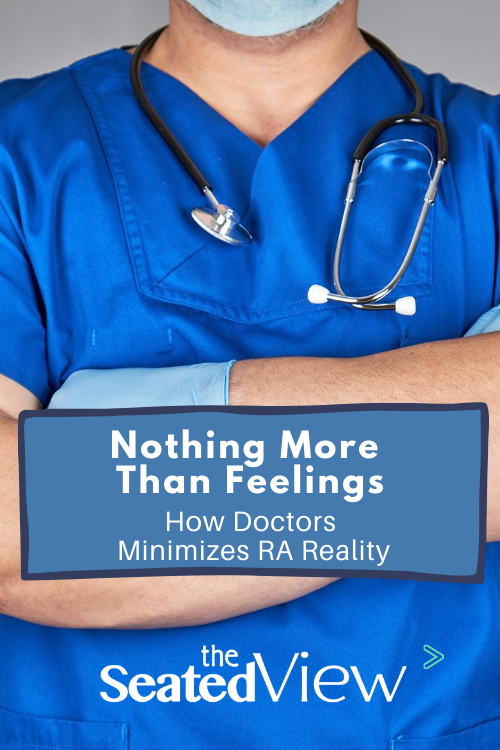Nothing More than Feelings: How Doctors Minimize RA Reality

Updated August 30, 2020
Catastrophizing is a popular concept in medicine, particularly when dealing with rheumatoid arthritis (RA) and chronic pain. You’ll find endless studies and articles on the concept, described as negative self statements, feelings or coping strategies. For instance, someone saying “this is the worst pain I’ve ever had” or “what if I can’t hold my baby” is categorized as catastrophizing. Those of us who have experienced the pain of RA might call them realistic statements, but we are not in charge of doing the studies. And that led me to thinking about how RA is treated. When feelings of worry and despair are dismissed, waved off as a dysfunctional coping strategy, how does that impact medical care?
Let’s check this scenario:
Patient: “this is the worst pain ever.”
Doctor: “you’re catastrophizing. This is a sign of bad coping skills.”
Fabulous. There you are, in the midst of extreme pain and your doctor says you’re exaggerating and not coping well. That’ll shut you up in hurry, won’t it?
Let’s try another scenario:
Patient: “this is the worst pain ever.”
Doctor: “I’m so sorry to hear that. That must be really hard.”
See the difference? In scenario #2, the doctor listens, hears the message and uses empathy/sympathy. By doing so, they have made it safe for the patient to express how they truly feel. Right there, you have the beginning of a conversation that is more likely to include a deep honesty from both sides. When a patient feels it is okay to truly say how the disease impacts their life instead of feeling pressured to buck up and underreport their symptoms, the doctor is more likely to fully understand the patient’s reality. And when that happens, patients are more likely to trust their doctor, follow their suggestions and have faith in the treatment. And this makes the.treatment much more likely to be effective and successful.
In my previous career, I was a social worker. One of the very first things we learned in the MSW program was that your client’s feelings are always valid. Always. In order to be an effective agent of change — a.k.a. social worker — you must respect where your client comes from. In order to help, you must first accept their reality. If you don’t, you are no use to them.

You cannot guide someone out of the woods unless you first go in and join them where they are.
Doctors are agents of change, too. But they are not taught to respect the minds and hearts of their patients. Instead, they learn to focus on measurable physical events, leaving all those pesky feelings at the door. This is the equivalent of treating diabetes with medication and ignoring diet. Of treating heart disease with medication only and ignoring lifestyle changes. Or of treating RA with medication only, ignoring the rest (oh wait, that’s what actually happens). And you — doctors, the medical literature — wonder about poor coping styles? They originate right there in your doctor’s office, when patients’ feelings are dismissed or silenced.
People are more than just their body. They are also their minds and hearts and they all play interconnecting roles in illness and coping with illness. The mind-body link is acknowledged pretty much everywhere as being an important factor in health and you ignore it at your peril. People will have better outcomes, better coping styles, and better health if they are treated from a holistic point of view instead of focusing merely on their parts.
So for those in the medical profession, please set about getting comfortable with feelings. Maybe talk to a social worker or a psychologist or read a book about how best to engage with your patients and start practicing. Think about why it is that for people diagnosed with cancer, their first step is to see an oncology social worker. And think about why people diagnosed with a serious chronic illness do not get the same consideration.
And for those of us on the receiving end of medical care, let’s start including a discussion of what we feel and think about our condition and how this impacts our lives in every medical appointment we have, as well as insist that our doctors consider all of us in their approach to treatment. Let’s start asking for help when we need it.
Let us not be silenced any longer.

Check my sources:
Benamar, S. et.al., Catastrophizing in Rheumatoid Arthritis. ACR Meeting Abstracts. https://acrabstracts.org/abstract/catastrophizing-in-rheumatoid-arthritis/.
Keefe, F. J., Brown, G. K., Wallston, K. A., & Caldwell, D. S. (1989). Coping with rheumatoid arthritis pain: catastrophizing as a maladaptive strategy. Pain, 37(1), 51–56. https://doi.org/10.1016/0304-3959(89)90152-8
Sinclair, V. G. (2001). Predictors of pain catastrophizing in women with rheumatoid arthritis. Archives of Psychiatric Nursing, 15(6), 279–288. https://doi.org/10.1053/apnu.2001.28686
Tag: catastrophizing, chronic pain, coping, doctors, medical, mental health, pain, rheum, rheumatoid arthritis, women and pain
8 Comments
Read More
Discover what else I've been writing about...
















I LOVE the idea of having a chronic illness social worker. Hope society will get around to it sooner rather than later.
This comment has been removed by the author.
In a perfect world I see a more integrative team working with us and with each other so the professionals can learn from each other while helping us in the best way possible.
Chord. Struck. I've almost got up the courage to ditch my rheumatologist. I keep thinking I can train him to be a better doctor, but instead he's been teaching me to not be a patient out loud around him. I think, though, that if I left him he would be astonished–and that keeps me thinking I could help him be a better doctor to someone else if I just spoke up enough.
Yeah, yeah, and how's that workin' out so far… Good thing I don't need him much at the moment.
actually, if my doc said that he was sorry to hear that, and it must be really hard, I would assume he had just been to some seminar where he had learned that that is the thing to say. Try it, the seminar leader would say. Then make puppy dog eyes, and your patient will feel understood, and shut up and stop whining at you. It will really keep patient flow through the office!
I am lucky in that the practice I currently go to has doctors and a fabulous PA that all listen to their patients. Pretty rare, especially here in the US!
This comment has been removed by the author.
Joan RA Dr. first had would say I treat inflammation which helps the pain. Best thing I did was purchase a book all about living with RA, educated myselp. Found me a different Dr.,second question he ask me, what do you take for pain? Going to first Dr. for first 6 months, I was so suicidal trying to tough out the pain.